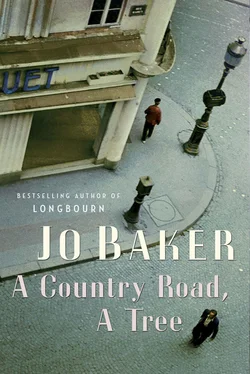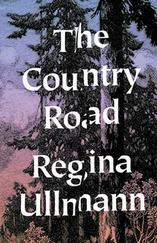He looks down at the clean green serge of his Red Cross greatcoat, with its white and red armband, then back at her, nonplussed. Nearby, a pigeon scrats in the gutter. It is an ugly battered thing, peg-legged. Pigeon pie.
“No,” she says. “Your other coat.”
“Oh, yes. I left it behind, in Ireland.”
“Why did you do that?”
He’d hung it up in the wardrobe in his mother’s spare room. With his father’s still-cherished overcoat and shoes, her fox fur, the stink of camphor. He’d closed the door on it and turned the key, that same evening, in that same darkness, his mother’s shawl still over his arm.
“It seemed like the right thing to do. Anyway, they gave me this one, so.”
“Will they let you keep it?”
“Oh. I don’t know.”
She tsks, shakes her head. “What’ll you do, then, when your contract’s up?”
He shrugs.
“What do you think a new coat would cost, right now?”
“I have no idea.”
“Well,” she says. He is still himself, for all he’s changed. “You’ll find out, I suppose. Till I see you.”
Then she kisses him again, because it seems the thing to do, and she turns away, and she clips down the Métro stairs.
Now that she is gone, he could go back to the empty apartment, to the peace and solitude of it. He could turn the key on the rest of the world and let him and the silence warm to each other; he could find a notebook, start to write. But instead he walks, hands stuffed into his pockets, turning the pebble round and round in his fingertips, the collar of his greatcoat scratchy at his jaw. He presses on through the half-broken, skin-and-bones, scraping-by life of the place, through the city clattering with footfalls and pierced with voices and rumbling with drays, past the men in old coats and shoes worn to shreds, and young women in threadbare dresses and bright lipstick, and the old ladies in black clothes who have shuffled their way through the war with shopping bags and hairnets intact. The blue paper has gone from the street lamps. They have torn down all the German signposts, and the yellow placards from outside the Jewish shops. And the city, ticking over, ticking on, is nonetheless thick with loss, as infested with absences as the hospital is with rats. Walking in Paris, in October 1945, is the loneliest thing in all the world.
He takes his cigarette packet out and touches the one remaining cigarette. He puts the packet back.
He will get used to it, just as he has grown accustomed to the missing teeth, the missing toe, his scar. He will learn to accommodate the loss.
—
There are places, even in the ruins, that are touched by grace. Saint-Lô at night, and a little window is warm and lit. It is curtained with an old lace shawl to disguise the new and dimmer substitute for glass and the figures that move around on the other side.
Because inside the small front room, there’s a piano and a tumbler of Calvados, and there’s music playing, and it is all quite pleasant and comfortable and people do like to be there. Men like to be there. That Calvados on the piano-top is his, and he sips it whenever the music allows him to, because it is him playing the music, popular and sentimental songs. One of the girls leans against the instrument and watches him play. He is surprised, rather, by the ease of the music after so long an absence; his fingertips find their way without much need for thought. The Calvados may be helping with that, since he is not concerned about the performance; he just performs. The old upright is practically in tune, though the middle C key has gone mute. Which is not bad, when so many other pianos are now tangled wires and splintered teeth.
The prostitutes wear cardigans over their slips and frocks. They have boots and slippers and bare legs. They shiver and huddle into themselves; their skin is blueish. There’s something familiar about the girl who’s watching him play; he can’t quite place her, but then he’s half-cut, and the uncut half is taking care of the music, so that doesn’t leave anything very much for working out where he has seen the prostitutes before.
Late on, blurry with drink, he’s obliged to leave the piano and amble off to find the necessary. He opens an inner door expecting a back room or the kitchen, but there’s night air and stars above, where the walls and roof have been blown clean off. A man is pissing up against a heap of broken bricks. Finished, the fellow buttons up and slips past him with a grin, heading back indoors. He takes his turn out in the night and adds his water to the musky pool. As he pisses, he lifts his face to the rain, closes his eyes, enjoys the easy sway of his own Calvados-adjusted senses.
The door shut behind him, he returns to the piano, and people are talking and laughing and going on as if there were a whole house standing square around them, not just a few chancy habitable rooms. This is what the world is liable to do nowadays — collapse in ruins — and people go on behaving as though it were nothing very much at all.
He sips from his cigarette, one hand keeping the rhythm going; then his smoke smoulders and fades out in a saucer, and a girl tops up his drink, and when the woman leans closer as a song ends, he gets up to hear her, and someone else slides into his seat at the piano, and his head reels and the woman takes his arm and smiles, and says his French is sweet.
“Come upstairs with me,” she asks, “why don’t you?”
And so she leads him off upstairs, and it turns out that he is drunker than he’d thought he was, or that the stairs are out of kilter: they pitch him sideways, so that he has to hang on to the bannister and clamber up them like a mountaineer. Perhaps what’s familiar about her is just hunger: the pinched look, the stick-thin, bones-on-show appearance makes sisters of them all. French women just look like that now.
Upstairs with her, the door shut behind them, and she peels off her cardigan and steps out of her slip, and he can see the press of hipbones through the skin and the dip like salt cellars in her collarbone, and when she lies down her breasts fall away sideways from the bones of her ribcage, and her breasts are so soft, very soft, and traced with mother-of-pearl stretchmarks, and he rolls a prophylactic clumsily on and is inside her, and it is only just as he comes that he remembers her, heavy with pregnancy, handing him a bottle of Calvados and telling him he was welcome here.
—
A pack of boys races down the newly surfaced roads; smaller kids huddle together on the corner, hovering over a concoction of mud and leaves. Girls have chalked a game on to the ground and are skipping through it. He walks, clipboard in hand, beside the colonel.
“On the whole, successful, I’d say.”
“And the corpses dealt with?”
“Incinerated, yes. You know what the kids are like here. Play with anything.”
They stop short to allow a pack of little children to thunder by.
“This is a hospital, not a playground!” the colonel yells after them.
They hurtle on, joyous, heedless.
“This place is getting lousy with them,” the colonel says. “Worse than the rats. Someone’s going to get hurt.”
The building work continues. Trucks grind back and forth; there are staff cars, locals’ cars, and half a dozen ambulances that hurtle in and out of the site at all hours, day and night. The children do stand a good chance of getting hit.
“Their mothers send them to play here,” he says.
These are kids who are missing fingers, who have brutal scars beneath their clothes; these are kids who are also missing parents, brothers, sisters, friends. For all the risks from traffic, they’re safer here than anywhere else for miles and miles.
Things are getting better. Things are becoming sound. There’s asphalt on the roads and on the paths. There’s glass, or something like glass, in all the windows. There’s lino on the labour-room floor — since there is breeding still, even now, even in this devastation. There are curtains round the beds, and clean sheets and warm blankets neatly tucked in. The operating theatre gleams with aluminium and sterile steel. The rain doesn’t drip through, the wind is kept at bay, the rats are in retreat. There is tea and there are biscuits and there is bread-and-jam when it is required, and it is often required. There’s kindness here. There’s decency amongst the ruins. It is something to behold.
Читать дальше










